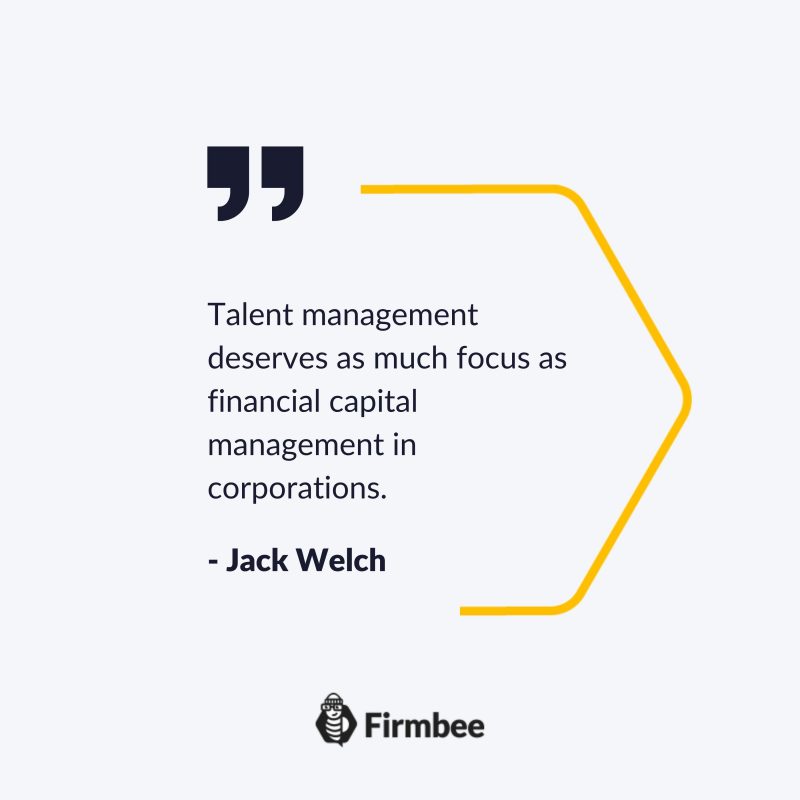Is talent management about finding the right person for the job? What is the role of Human Resource in talent management? What is talent management and why is it so important for your company? Read the article to find out more about the role of recruitment and other processes in talent management.
Role of recruitment in talent management – table of content:
- What is talent management?
- Who is responsible for talent management?
- Talent management strategies
- Summary
What is talent management?
Most of the people believes that talent management is about searching for the best matching candidates for the job advertised. It is correct assumption, because great talent management starts in HR department during recruitment, but talent management goes beyond the hiring and requires much more effort. After searching for a person and a hiring the right individual, there is a time for even more processes that constitute talent management: onboarding, training, reviewing the performance and career planning.
Contemporary companies have to do their best to lower the turnover of employees and rise the employee retention – only good quality talent management may stop great employees from leaving prematurely. Higher retention of carefully selected talents is one of the most important factors that lead to success on the market.
Talent management is not simple – in fact it is very demanding as a process and requires a lot of attention, strategic thinking and planning. Greater understanding of importance of talent management means that activities of Human Resources departments may become the core element of the companies in the future. Without good talent management there is no progress, since high turnover of employees is always seen as unnecessary cost.
Some of the managers point out that currently on the job market there is ongoing, fierce competition between companies that have to do all their best to attract the most talented employees. The job market has never seen as high as it is today need for high-quality candidates. The increase in demand for cognitive power is not going to slow down – some of the highest, most challenging positions stay open because there is not enough suited individuals to fill them.
Who is responsible for talent management?
Human Resources department are not longer the only players accountable for talent management, although the whole process starts at the very beginning with the recruitment and hiring. It has been noted that other departments across the company have significant impact on talent retention as well.
In smaller companies talent management is one of the duties of HR manager, but bigger organizations appoint individuals that overview several departments and carry more specific job titles that are not related to HR roles. Individuals that specialize in talent management may no longer be the part of HR team.
Talent management requires strategic planning that reflect the whole career of an individual employee in the company. The process starts with recruitment and goes through: hiring, onboarding, training, assessment, up to promotion. It should include processes related to remuneration and deal with: salaries and benefits. Working conditions, additional perks of non-financial value have to be considered as well. Talent manager has become one of the most important roles in the contemporary company.

Talent management strategies
There are several talent management strategies that seem to be successful.
The very first step in talent management is the review of present workforce. The search for best future leaders should always start within the own company. Some of the talents may be already on board and they are just waiting to be identified and moved into different positions. Careful review of the whole current staff allows to find gaps in employment and positions that are on need to be filled with new employees.
The recruitment is our second, the most obvious strategy and it encompasses hiring and onboarding of new employees. Here the role of recruitment in talent management cannot be ignored. Managers should consider two distinct ways of searching: program of referrals and head-hunting. The mere advertising may not be sufficient if the company needs to find talent. Try to encourage the most talented and accomplished of your employees to talk to other specialist that may be interested in the position in your company.
Good quality employee referral program may be cheaper than traditional, long, non-effective recruitment, and definitely most effective, when the quality of the candidate is the factor. Head-hunting may prove even more effective – it may be costly at the initial stage, but acquisition of talent was never cheap, then it is worth to calculate the cost.
The third strategy is related to the value of work itself. Managers should keep their talented employees happy and busy. Boredom is more dangerous than lack of promotion – talented individuals cannot be left without challenges that match their potential. The company needs to make an investment and provide employees with training, coaching programs and opportunities for development otherwise they may decide to leave to better pastures.

Summary
Talent management has to become a part of company culture. The role of right approach cannot be underestimated in talent management – without careful planning of career paths of your employees and strategic thinking about their possibilities for development there is no progress and innovation. High turnover is the most detrimental factor for companies that have to make their best to keep their talents on board. Talent management is the approach needed to keep employees productive and boost the retention rates.
Read also: A link between diversity management and equal employment opportunity in the workplace
If you like our content, join our busy bees community on Facebook, Twitter, LinkedIn, Instagram, YouTube.
Author: Nicole Mankin
HR manager with an excellent ability to build a positive atmosphere and create a valuable environment for employees. She loves to see the potential of talented people and mobilize them to develop.


















